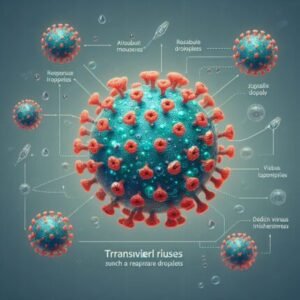Medically reviewed by Dr. Ramesh Gaddam, M.D. — Written by Sumalatha, D.N.H.E
Table of Contents
ToggleMeasles is a very contagious virus that causes fever, cough, runny nose, sore throat, and a red rash. It spreads easily through coughing, sneezing, and touching contaminated surfaces. Measles can be serious, especially for young kids and those with weak immune systems. It can lead to pneumonia and brain swelling, and sometimes death.
Causes of Measles
Following are the various causes of Measles:

Viral Infection
Measles comes from a virus called the measles virus (MeV). It spreads easily from person to person.
How It Spreads
The virus moves through the air when an infected person coughs or sneezes.
It can also live on surfaces and spread when people touch those surfaces and then touch their face.
Highly Catchy
Measles is very contagious. Even before someone shows symptoms, they can pass it to others.
Who’s at Risk
People who haven’t gotten the measles vaccine and those who haven’t had measles before are at risk.
This includes babies, pregnant women, and those with weak immune systems.
Why Vaccination Matters
Getting vaccinated with the measles, mumps, and rubella (MMR) vaccine is the best way to avoid measles.
It helps protect not only you but also others around you.
Symptoms of Measles
Symptoms of Measles include:

Early Signs
- High Fever: Measles often starts with a high fever.
- Runny Nose: A runny or stuffy nose is common.
- Cough: A persistent cough may develop.
- Red Eyes: Eyes may become red and sensitive to light.
Distinctive Symptoms
- Koplik’s Spots: Small white spots may appear inside the mouth.
- Rash: A red or reddish-brown rash breaks out, starting on the face and spreading down the body.
Other Possible Symptoms
- Sore Throat: Throat discomfort or pain can occur.
- Fatigue: Feeling tired or weak is typical.
- Body Aches: Muscles may ache or feel sore.
- Appetite Loss: Less interest in eating may happen.
Seek Medical Attention
If you or someone you know shows these symptoms, especially the rash, seek medical advice promptly, particularly if not vaccinated against measles.
Measles Diagnosis
Diagnosing measles involves examining symptoms, asking about exposure, running tests, and ruling out other illnesses. Early detection is vital.

Checking for Measles
Doctors check for signs like fever, cough, runny nose, red eyes, and a rash.
Asking Questions
They ask if you’ve been near someone with measles or traveled to places where measles is spreading.
Tests
Blood tests or swabs from your throat can confirm if it’s measles.
Looking at the Rash
Doctors look at the rash and any white spots inside your mouth.
Ruling Out Other Illnesses
They make sure it’s measles and not something else with similar symptoms.
Key Steps
Doctors use their judgment, and sometimes, they ask other experts to be sure.
Conclusion
Doctors diagnose measles by looking at symptoms, asking questions, running tests, and considering other possibilities. Finding it early helps stop it from spreading.
Risk Factors of Measles
Measles, a highly contagious viral infection, poses significant health risks, especially for vulnerable populations. Understanding its risk factors and prevention is crucial.

Unvaccinated Individuals
Those who haven’t received the measles vaccine are at higher risk.
Traveling to Affected Areas
Visiting regions with measles outbreaks increases the risk.
Infants
Babies under 1 year old are vulnerable due to incomplete immunity.
Weakened Immune System
Conditions like HIV/AIDS or certain medications can lower immunity.
Pregnant Women
Measles can pose serious risks to pregnant women and their unborn babies.
Crowded Environments
Living in or visiting crowded places increases exposure risk.
Healthcare Workers
Those in healthcare settings face increased exposure to infected individuals.
Malnutrition
Poor nutrition weakens the immune system, making individuals more susceptible.
Recent Measles Exposure
Being in close contact with someone infected with measles increases risk.
Complications of Measles
Measles, a highly contagious viral infection, can lead to severe complications and poses a significant public health concern. Understanding its risks is crucial for prevention.
Pneumonia
Infection of the lungs, a common and potentially severe complication of measles, especially among young children and adults.
Encephalitis
Inflammation of the brain, which can lead to seizures, permanent brain damage, or even death in severe cases.
Ear Infections
Measles can cause ear infections, leading to hearing loss if not promptly treated.
Severe Diarrhea
Complications like dehydration and electrolyte imbalances can result from severe diarrhea caused by measles.
Blindness
Measles can lead to blindness due to corneal scarring or inflammation of the optic nerve.
Immunocompromised Individuals
For those with weakened immune systems, measles can lead to severe and life-threatening complications.
Pregnant Women
Measles during pregnancy can result in miscarriage, preterm birth, or low birth weight, posing risks to both mother and baby.
Long-Term Effects
Some individuals may experience long-term effects, such as subacute sclerosing panencephalitis (SSPE), a rare but fatal complication affecting the brain.
Treatment for Measles
There’s no specific antiviral medication to treat measles.
Supportive Care
- Rest: Get plenty of rest to help the body fight the infection.
- Hydration: Drink plenty of fluids to stay hydrated, especially if fever is present.
- Fever Management: Over-the-counter fever reducers like acetaminophen or ibuprofen can help reduce fever and discomfort.
- Relief for Symptoms: Use throat lozenges or cough syrup for a sore throat or cough.
Prevent Complications
Monitor for Complications: Watch for signs of complications like pneumonia or dehydration.
Seek Medical Help: If complications arise or symptoms worsen, seek medical attention promptly.
Isolation
Isolate: Stay home from school or work to prevent spreading the virus to others.
Avoid Contacts: Minimize contact with others, especially those who are unvaccinated or at risk.
Vaccination
Future Protection: Vaccination with the MMR vaccine can prevent measles and should be considered if not already vaccinated.
Always consult a healthcare professional for personalized advice and treatment options.
Prevention of Measles
Prevention of Measles involves:
Vaccination
The measles, mumps, and rubella (MMR) vaccine is highly effective in preventing measles.
Ensure vaccination according to the recommended two-dose schedule, typically given in childhood.
Herd Immunity
High vaccination rates contribute to herd immunity, protecting those who cannot receive the vaccine, such as infants and individuals with certain medical conditions.
Vaccination Recommendations
Follow national immunization guidelines for routine vaccination against measles.
Consider vaccination before traveling to areas where measles is prevalent or outbreaks occur.
Precautions
Stay away from individuals with measles if possible.
Wash hands frequently with soap and water, especially after coughing or sneezing, and avoid touching the face.
Cover the mouth and nose with a tissue or elbow when coughing or sneezing to prevent the spread of respiratory droplets.
Public Health Measures
Monitor measles outbreaks and implement appropriate control measures, such as case isolation and contact tracing.
Promote awareness about measles, its symptoms, and the importance of vaccination through public health campaigns and educational initiatives.
Preventing measles relies on vaccination, maintaining high vaccination rates, practicing good hygiene, and implementing public health measures to control outbreaks and protect vulnerable populations.
Also Read:
Frequently Asked Questions
There are some questions frequently asked by users regarding Measles.
How do we prevent measles?
Vaccination with the measles vaccine is the best way to prevent measles.
Who can get measles?
Anyone who has not been vaccinated against measles or previously infected can get it.
Where does measles come from?
Measles is caused by a virus called the measles virus and spreads through respiratory droplets from infected people.
How do you treat measles rash?
Treatment focuses on relieving symptoms, such as fever and discomfort. Keeping the skin clean and moisturized can help soothe the rash.
Can I take a bath if I have measles?
Yes, taking a lukewarm bath can help reduce fever and relieve discomfort caused by measles.
Can a child with measles take a bath?
Yes, bathing can help alleviate symptoms of measles in children, but it’s essential to use lukewarm water to avoid further irritation.
What is the best treatment for measles?
There is no specific treatment for measles. Supportive care, rest, and staying hydrated are key for recovery.
How many days does measles last?
Measles typically lasts for about 7 to 10 days from the onset of symptoms.
How many days rest for measles?
Resting until the fever subsides and symptoms improve is crucial for recovering from measles.
Can you catch measles twice?
It’s rare, but possible to get measles more than once if immunity wanes or if the initial infection was not complete.
How can I speed up the recovery of measles?
Getting plenty of rest, staying hydrated, and eating nutritious foods can help speed up recovery from measles.
What should I eat when I have measles?
Foods that are easy to swallow and provide nutrients such as fruits, vegetables, soups, and soft foods like yogurt can be beneficial.
What not to eat if you have measles?
Avoid spicy or acidic foods that may irritate the throat and esophagus. Also, limit sugary and processed foods.
Is measles itchy?
The measles rash may cause itching in some cases, but it’s not a universal symptom.
Can we drink tea in measles?
Yes, drinking warm herbal teas can help soothe a sore throat and provide comfort during measles.
Medically reviewed by Dr. Ramesh Gaddam, M.D.

General Physician, Diabetologist, and Critical Care Specialist.
Related
Discover more from Health Build-Up
Subscribe to get the latest posts sent to your email.
Pingback: Kids Health : How to Create a Healthy Environment for Kids